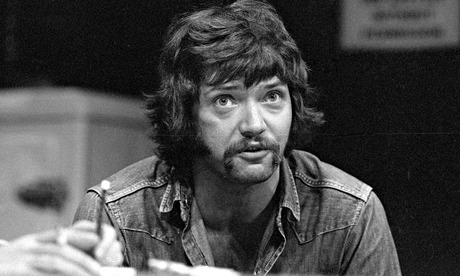
By 1969 I'd done a few roles for Sidney Bernstein's Granada Television, which was the place for new, dangerous drama, and a couple of plays at the Royal Court. I was in their first revival of Look Back in Anger. John Osborne came along to rehearsals a lot – he was shocked at how gritty and visceral we'd made the production. It was an incredibly exciting time – I felt part of a movement of dissent. I did the premiere of David Storey's The Contractor, with the great Lindsay Anderson, and then I did a play called Cancer, which was later renamed Moonchildren.
Cancer was based on the experiences of its writer, Michael Weller. It's about a group of students who rent a flat. It's a very funny and very realistic play, a bit off the wall. It has the zeitgeist of 1969 – elements of flower power and cynicism about flower power.
And lo and behold Roman Polanski came to see it. He was living around the corner in Chelsea. and I got a phonecall from him. Would I like to meet him? So I went to his little mews house and he said he was making a film of Macbeth. Did I know the play? Only inside out, I said. It was one of the first things I'd done at school – I was a somewhat falsetto Macduff and then played Malcolm at Hornchurch Rep.
Roman had a huge painting on his wall of a medieval warrior standing on a beach over a man he'd obviously just killed. He said that was the style he wanted to do the film in. He said I would possibly be a great Macbeth. So he organised a screen test at Shepperton. When I saw who else was being tested, my heart sank. I did the best I could, sat around for a few days and then he phoned. He said: "You're not going to play Macbeth. You're getting the second best role." And that was Banquo. Lovely Jon Finch was Macbeth and Francesca Annis was Lady Macbeth.
Kenneth Tynan co-wrote the screenplay. I remember one change Ken made. When Macbeth says "My way of life is fall'n into the sere, the yellow leaf", Ken changed it to "My May of life" which makes sense because of the opposition between spring and autumn. It helped because Macbeth was being played by a much younger man than usual.
We filmed the battle scenes at Black Rock Sands in Wales. There was a lunchbreak and my wife arrived. She looked around and way over on the horizon there was a solitary figure digging in the sand and burying a dead horse. She said: "My God, I heard Polanski was a hard taskmaster but he's not even giving the prop man a lunch break." I said, "Are you kidding? That is Polanski!"
One day we were filming the arrival of Duncan at Glamis castle. We had 300 extras and 200 horses. It was shot in one of the huge soundstages at Shepperton. And a huge storm was supposed to burst so we had gallons of rain and lightning flashes. I had an idea about Banquo's relationship with Lady Macbeth – that he probably was not very keen on her. I put this to Roman and he exploded: "What are you talking to me now for? Can't you see what I'm dealing with?" I made my apologies.
And we carried on – the set-up took three hours. Then Roman said, "OK. Let's go. Martin, what was it you wanted to talk about?" I explained my idea. He said, "Fantastic! I'm going to shoot it!" And I thought: this is the world's greatest director. He was able to handle an epic and yet speak to you about the intricacies of the script and the interpretation.
• Twelve Angry Men is at the Garrick theatre until 15 March 2014
More from Monologue:
• Simon Callow: We found a glitterball and a DJ, let rip and got stonking drunk
• Linda Bassett: sharing a fenland cottage with Caryl Churchill changed my career
• Tim Pigott-Smith: how Ian McKellen made me raise my acting game

